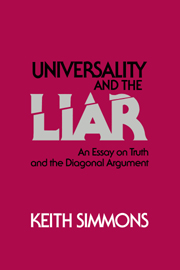Book contents
- Frontmatter
- Contents
- Preface
- Chapter 1 The Liar paradox
- Chapter 2 The diagonal argument
- Chapter 3 The diagonal argument and the Liar, I
- Chapter 4 The diagonal argument and the Liar, II
- Chapter 5 A medieval solution to the Liar
- Chapter 6 A singularity solution to the Liar
- Chapter 7 A formal account of singularities
- Chapter 8 Applications and further singularities
- Chapter 9 Semantic universality
- Notes
- Bibliography
- Index
Chapter 9 - Semantic universality
Published online by Cambridge University Press: 19 October 2009
- Frontmatter
- Contents
- Preface
- Chapter 1 The Liar paradox
- Chapter 2 The diagonal argument
- Chapter 3 The diagonal argument and the Liar, I
- Chapter 4 The diagonal argument and the Liar, II
- Chapter 5 A medieval solution to the Liar
- Chapter 6 A singularity solution to the Liar
- Chapter 7 A formal account of singularities
- Chapter 8 Applications and further singularities
- Chapter 9 Semantic universality
- Notes
- Bibliography
- Index
Summary
There is a familiar danger threatening any account of the Liar: The proposal may appeal to semantic concepts that themselves generate new paradoxes that the proposal cannot handle. The singularity theory has appealed to the semantic notions of groundedness, singularity, and truth (and falsity) in a context. Can the singularity proposal accommodate these semantic notions? In this chapter, I argue that it can: These notions can be incorporated into the object language for which the singularity theory provides an account.
There is another related danger. There may be things that can be said that cannot be said in the object language, on pain of paradox. Perhaps we can diagonalize out of the object language to an essentially richer metalanguage. Perhaps the language of the theory itself stands as a Tarskian metalanguage to the object language. Then semantic paradox is ultimately avoided in the Tarskian way, and this undermines any antihierarchical approach, like the singularity approach. I shall suggest that the singularity proposal avoids this danger. I shall argue that the language of the singularity theory is not a Tarskian metalanguage for the object language: There is no diagonalizing out of the object language. I shall conclude that the singularity proposal does justice to the intuition that a natural language like English is semantically universal.
GROUNDEDNESS (AND “SINGULARITY” IN ONE SENSE)
The notion of groundedness is a central notion of the singularity theory. Yet the notion may appear to give rise to paradox.
- Type
- Chapter
- Information
- Universality and the LiarAn Essay on Truth and the Diagonal Argument, pp. 159 - 182Publisher: Cambridge University PressPrint publication year: 1993



